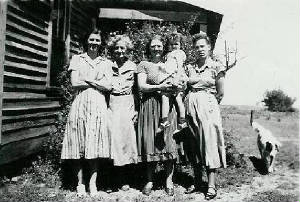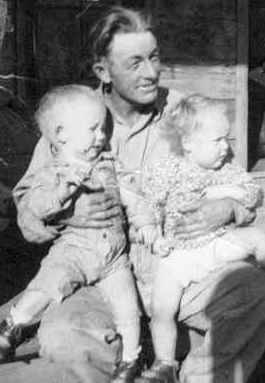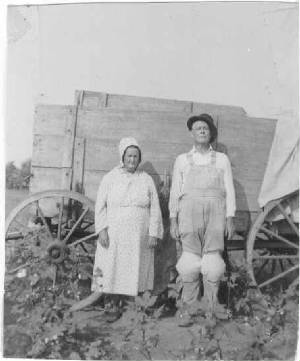|
Cousin Vivian sent this picture and wrote, "I am not sure when this picture was taken but
it was probably in the mid nineteen forties. This is Naomi 'Aunt Nancy', Granny, Harvena 'Aunt Red' holding Susie, and Aunt
Nell. During the war Granny worked for the Red Cross in Cooper with Aunt Nancy and others. That was when she had her hair
cut and we found that she had this beautiful naturally curly hair."

There was a lot of talk about war, we heard it on the radio, from the neighbors and at school.
The teachers told us that war had already began in Europe in 1939 when German aircraft, tanks, and motorized troops attacked
Poland. We learned that the people were ruthlessly slaughtered as the Germans devastated their cities. We kids were terrified
when we heard these things and thought the Germans might bomb us at anytime.
Then came the paralyzing news on the radio; the Japanese had made an attack on our naval base
at Pearl Harbor in Hawaii. About 360 planes dropped their bombs that sunk eighteen ships and killed and wounded 3,700 people
including civilians. Everyone was glued to the radio. Then came a special report from Washington D.C. President Franklin D.
Roosevelt had signed a declaration of war against Japan. He called December 7, 1941, "A day which will live in infamy."
Our worse nightmare had come true, our country was at war. Then four days later on December
11, Germany and Italy declared war on the United States, and in return Congress declared war on Germany and Italy.
The president called for volunteers to join the military service and set up draft boards in
many cities. My daddy, Wes Tom, was the right age to be drafted and thought surely he would be called, but the farmers received
a deferment, as the government needed everything they could produce for the war effort and he was never called.
Our country needed a lot of money to finance the war and called on everyone to buy War Bonds. Our teacher
told us we could help also by buying war stamps. She gave each of us kids a stamp book and she put one ten cent stamp in each
one, and told us we could buy more stamps at the post office. It took eighteen dollars worth of stamps to fill a book, then
we could exchange it for a War Bond that would be worth twenty five dollars when it matured. (I remember buying a few stamps
and putting them in the book but I don't think I ever got it filled).
With the coming of World War Two the depression soon ended. Defense plants started up in many
cities and many more jobs became available. Now just about anyone could find a good paying job. Daddy begin to get more money
for the cotton and he got a good raise at the gin. Soon he bought a tractor and equipment; we really needed it now that we
had the new land. We still rented the land from Granny and farmed it also. Now we were growing twice as much cotton as before
and with the higher price of cotton we were doing pretty well. We bought new furniture for the house and a new kerosene cook
stove.
We still didn't have electricity in our area yet and Daddy bought a thirty six volt gasoline
powered power generating plant that would charge six, six volt batteries at one time. This was still not enough power to run
large appliances but we were able to have two radios, lights in both rooms and a few small appliances. It was still several
years before electricity came to our house.
Big Mama and Pa moved into our old log house and used the old wind-charger. When the wind didn't
blow for awhile Pa would carry the dead battery to our house, about a half mile, and exchange it for a hot one from the power
plant.
Everyone seemed to have money now but there were still some things that we could not buy because
of the war. Many things were rationed; such as sugar, flour, coffee, tea, gasoline, tires and other things. The government
issued ration books to every family. The larger families got more books. When we bought things that were rationed we had to
give the merchant coupons from the book as well as the money. I remember tires for our car were especially hard to come by;
most of them went to the military. We ran the tires until they became so thin they would go flat; then we would patch the
hole in the tube and put a large rubber patch called a boot over the thin spot of the tire and run them some more. Daddy once
bought a trailer that he did not need, just to get the tires as they fit out car.
Many of our neighbors had sons in the military, and some of them got killed. Our closest neighbors
were the Lambs, they had a son in the Navy named Drew that was killed when enemy fire hit his ship. They had other sons, one
was about my age named Don Lamb. We were close friends and I was sad because of his grief. Our postman, Bruce Williams, had
a brother named Dale who was killed, and several others. We thought it was unusual for so many from our small community to
be killed but I suppose it was like that just about everywhere. We went to several of the funerals at the Lake Creek Cemetery;
I was impressed with the military men giving the twenty-one gun salute. This was a very sad time in all our lives.
There was an army camp north of Paris called Camp Maxey. When we would go to Uncle Jim and Aunt
Jessie’s house in Powderly, we would go by the camp. I remember seeing the soldiers marching down the parade grounds
that were near the gate. Many Prisoners Of War (POW) were kept there, both German and Japanese. Sometimes we would hear about
prisoners escaping and we were terrified that they might come to our house and kill us.
Some of the prisoners were allowed to go work in nearby cotton fields under heavy armed guards. (But Daddy
never wanted them in our fields.) One morning some of us kids were waiting for the school bus in front of the Lake Creek store
when three army trucks carrying prisoners stopped at the store, we could see the large letters POW on the back of their shirts
and we knew what it meant. They were accompanied by Jeeps carrying armed guards
with machine guns. Some of the men went in the store for a Coke and we kids must have looked frightened as we saw our country's
enemy face to face. One of the guards said, ‘Don't be afraid kids, they know what will happen if they try anything.’
On August 21, 1943 my parents fourth child was born, a boy and they named him Kenneth Gary Johnson.
Daddy nicknamed him Hawk. Our little two-room house was now getting very crowded, so Daddy bought an old house for fifty dollars,
to be torn down, just down the road. He tore it down and salvaged enough doors, windows and lumber to build two more rooms
on our house. He built a small bedroom for Kerry, the only girl at the time, and she was so proud of it.
That same year 1943, Big Mama got real sick. We took her to the hospital but she did not live
very long, she died of cancer and we were heartbroken.
In 1945 the war ended and our country breathed a sigh of relief. Things soon got back to normal;
the rationing ended and we enjoyed a time of prosperity. They remodeled the old cotton gin; they replaced the old steam engine
with a new diesel engine and new modern equipment. The new machinery would separate the cotton from the burr, the dried boll.
Now we did not have to pick the cotton out of the burr as before, just pull the burr off with the cotton. We called this,
"Pulling bolls." This was much faster and easier, but it would be many more years before there were machines to harvest the
cotton.
Daddy had learned how to work on the steam engine and the other equipment. He bought books and
studied them. Now he had to buy more books and study them to learn how to work on the diesel engine and the new machinery.
He was a good mechanic and could usually figure out how to make things work. After a time he could fix just about anything
in the gin, so the gin manager promoted him to ginner. He ran the gin stands, the machines that separated the seeds from the
cotton. When the gin would break down the gin hands had to make the repairs, but since Daddy knew how to fix just about any
part of the gin he did not have to do any actual repairing, he only had to tell the other hands how to do it. Also, good pay
raises came with this extra responsibility.
I had several cousins living near us in Lake Creek. Daddy's sister Naomi (Johnson) Cain and
her husband Everett Cain lived about a mile from us, just west of the Wilson home. I called them Aunt Mutt and Uncle Happy.
They had two sons, James Wesley and Aaron. (Elvena was not born yet). James Wesley was about a year older than me and Aaron
was about a year younger. Daddy's other sister Harvena 'Red' Johnson married Clayton Johnson. I called them Aunt Red and Uncle
Clayton. They had three children; Walter, Susie and Lola Nell. Walter was two years older than me and Susie and Lola Nell
were younger. Sue Ann's two daughters, Katie Bell and Mary Ann Flowers still lived with Granny. They were both a little older
than me. By now I was about twelve or thirteen years old.
Sometimes all us cousins, my brothers and sister and a few friends would go to Granny's house
on Sunday and play ball in her cow pasture. One day while we were playing a young man about twenty one years old came walking
down the road and said to us, "My name is Calvin Skeen, I think I may be some kin to you." We ran into the house and told
the folks that Calvin was outside; Daddy ran out and hugged him and cried. Calvin taught us many new games he had learned
at the orphanage and we taught him how to play ball. Although he was older than us he still liked to play with us. (Calvin
was Johnny's brother, my daddy's best friend who drowned in 1935).
Daddy had a brother named James Allen Johnson and he was married to Jessie, I called them Uncle Jim and Aunt Jessie. They had eight children: Roberta, James Allen Jr., Vida Mae, Wilber
Leo, Sarah Jane, Neomi Ruth, Haley Vena and Lillie Nell. They lived in Woodland Texas and we did not get to see them very
often. Sometimes they would come to see us and we would go their house about once a year. I always enjoyed going to see them;
Uncle Jim was a truck farmer, raising fruit and vegetables to sell to at the wholesale market. He had a small tractor and
he would let us kids drive it. We probably ruined more than we helped.
At this time my parents only had four children: Earl (me), Kerry, Jerry and Kenneth. On January
7, 1948 the twins Royce Dale and Joyce Gale were born. The twins were the apple of Daddy's eye and he spoiled them rotten;
we all did. We older kids thought he and Mama loved them more than they loved us. Maybe it was because they knew they would
be their last children.
Wes Tom holding the twins, Dale and Gale,
on the front porch of our old house at Lake Creek.

We still did not have electricity at this time and we still lived on a dirt road. When it rained the road
was muddy and we could not drive the car down it. If we needed something from the store Daddy, or one of us older kids, would
ride a horse to the Lake Creek store. We kids had to walk to the store to catch the school bus when the roads were too muddy
for the bus to go down. At times the road would be muddy for most of the winter.
When I was sixteen years old (1949) the Electric Co-op brought electric power lines to our house.
Daddy ordered wiring, electric supplies and an instruction book of basic wiring from the Sears Roebuck catalog and wired our
house and Granny's house. Then others in the area hired him to wire their houses as electricity came to them. This was quite
a lot of extra money for him and we really needed it. He was about the only one in our area who knew how to wire a house.
Daddy spent some of the money for a new electric refrigerator and other appliances including a new wringer-type washing machine.
This was a real help to Mama but she still had to draw water from the cistern and fill it; then drain the dirty water out
in a bucket and carry it out. So Daddy bought a long garden hose and hooked it to the washing machine and drained the water
into the vegetable garden. Surprisingly, this was a great help to the plants, and I'm sure it was a big help to Mama. He also
bought a new kerosene cook stove and got rid of the old wood-burning stove. We felt like we had moved to town. However, he
still had to cut wood for the potbellied heater.
Kenny 'Pa' and Dovie Stone, by our cotton wagon.

About this time Pa Stone remarried; he married a woman named Dovie Richardson. She could never replace Big
Mama but we soon learned to love and respect her. Some of our folks wondered why two old people like them wanted to get married,
assuming neither of them would live very long, for they were both in their late sixties. However, they lived together for
twenty eight years before they died. The picture on the left is of them by
our cotton wagon. They pulled bolls for they needed to make a little extra money as they only received a small monthly government
check called an Old Age Pension check.
Daddy was working at the gin, so when the wagon was full of cotton it was my job to hook up
the tractor (or horses when the tractor would not start) and take it to the gin. I was glad to do this
as it gave me a little break from pulling bolls. While I waited for the cotton to be ginned a quick visit to Granny's house
next door was in order. Sometimes I would walk to the Lake Creek store for a Coke and maybe stop by Aunt Ida (Wilson) Stegall's
house (Granny's sister) who lived near the store. At this time her daughter Anna 'Annie' (Stegall) Barnet lived with her.
They were both widowed. When Annie's husband, Jim Barnet, was living they owned the store and filling station in Lake Creek.
I loved to sit and talk to the old folks and listen to their stories about the old days; I wish I had written some of them
down.
|

